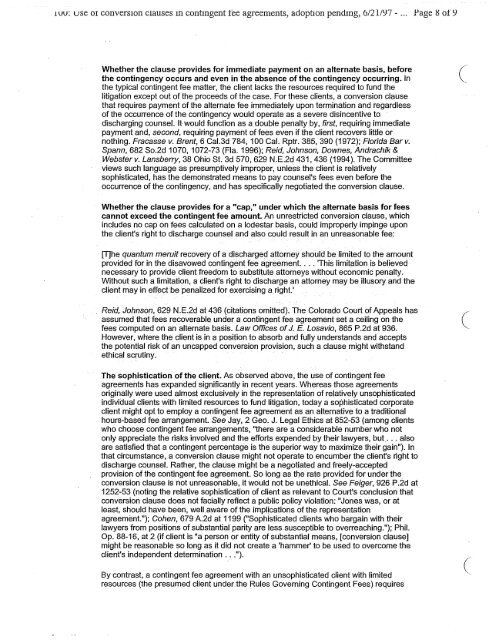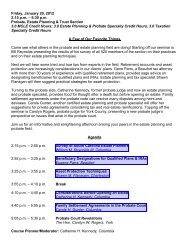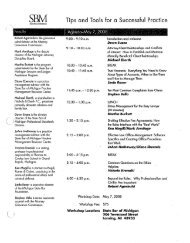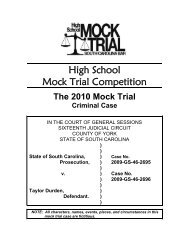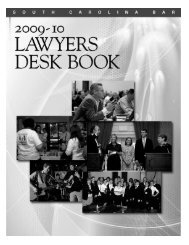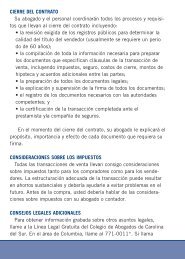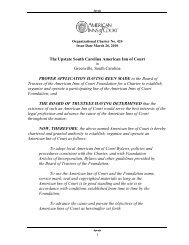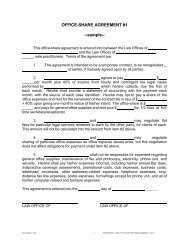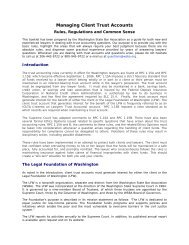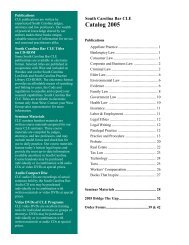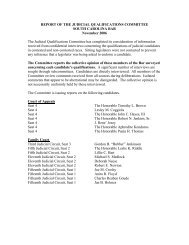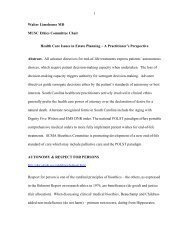Practicing With Professionalism - South Carolina Bar Association
Practicing With Professionalism - South Carolina Bar Association
Practicing With Professionalism - South Carolina Bar Association
Create successful ePaper yourself
Turn your PDF publications into a flip-book with our unique Google optimized e-Paper software.
lVV: use or converSIOn clauses m contmgent tee agreements, adoptIOn pendmg, 6/21/Y7 - ... Page ~ of Y<br />
Whether the clause provides for immediate payment on an alternate basis, before<br />
the contingency occurs and even in the absence of the contingency occurring. In<br />
the typical contingent fee matter, the client lacks the resources required to fund the<br />
litigation except out of the proceeds of the case. For these clients, a conversion clause<br />
that requires payment of the alternate fee immediately upon termination and regardless<br />
of the occurrence of the contingency would operate as a severe disincentive to<br />
discharging counseL It would function as adouble penalty by, first, requiring immediate<br />
payment and, second, requiring payment of fees even if the client recovers little or<br />
nothing. Fracasse v. Brent, 6 Cal.3d 784, 100 Cal. Rptr.385, 390 (1972); Florida <strong>Bar</strong> v.<br />
Spann, 682 So.2d 1070, 1072-73 (Fla. 1996); Reid, Johnson, Downes,Andrachik &<br />
Websterv. Lansberry, 38 Ohio St. 3d 570,629 N.E.2d 431, 436 (1994). The Committee<br />
views such language as presumptively improper, unless the client is relatively<br />
sophisticated, has the demonstrated means to pay counsel's fees even before the<br />
occurrence of the contingency, and has specifically negotiated the conversion clause.<br />
(<br />
Whether the clause provides for a "cap," under which the alternate basis for fees<br />
cannot exceed the contingent fee al11ount. An unrestricted conversion clause, which<br />
includes no cap on fees calculated on a lodestar basis, could improperly impinge upon<br />
the client's right to discharge counsel and also could result in an unreasonable fee:<br />
[T]he quantum meruitrecovery ofadischarged attorney should be limited to the amount<br />
provided for in the disavowed contingent fee agreement. ... 'This limitation is believed<br />
necessary to provide client freedom to substitute attorneys without economic penalty.<br />
<strong>With</strong>out such a limitation, a Client's right to discharge an attorney may be illusory and the<br />
client may in effect be penalized for exercising a.right.'<br />
Reid, Johnson, 629 N.E.2d at436 (citations omitted). The Colorado Court of Appeals has<br />
assumed that fees recoverabl~ under a contingentfee agreement seta ceiling on the<br />
fees computed on an alternate basis. Law Offices ofJ. E. Losavio, 865 P.2d at 936.<br />
However, where the client is in a position to absorb and fully understands and accepts<br />
the potential risk of an uncapped conversion provision, such a.c1ause might withstand<br />
ethical scrutiny.<br />
The sophistication ofthe. client. As observed above, the use of contingent fee<br />
agreements has expanded significantly in recent years. Whereas those agreements<br />
originally were used almost exclusively in the representation of relatively unsophisticated<br />
individual clients with limited resources to fun,d litigation, today a sophisticated corporate<br />
client might Qpt to employ a contingent fee agreement as an alternative to a traditional<br />
hours-based fee arrangement. See Jay, 2 Geo. J. Legal Ethics at 852-53 (among clients<br />
who choose contingent fee arrangements, "there are a considerable number who not<br />
only appreciate the risks involved and the efforts expended by their lawyers, but.... also<br />
are satisfied that a contingent percentage is the superior way to maximize their gain"). In<br />
that circumstance, a conversion clause might not operate to encumber the client's right to<br />
discharge counsel. Rather, the clause might be a negotiated and freely..accepted<br />
provision of the contingent fee agreement. So long as the rate provided for under the<br />
conversion clause is not unreasonable, it would not be unethical. See Feiger, 926 P.2d at<br />
1252-53 (noting the relative sophistication of client as relevant to Court's conclusion that<br />
conversion clause does not facially reflect a public policy violation: "Jones. was, or at<br />
least, should have been, well aware of the implications of the representation<br />
agreement."); Cohen, 679 A.2d at 1199 ("Sophisticated clients who bargain with their<br />
lawyers from positions of substantial parity are less susceptible to overreaching."); Phil.<br />
Op. 88-16, at 2 (if client is "a person or entity of substantial means, [conversion clause]<br />
might be reasonable so long as it did not create a 'hammer' to be used to overcome the<br />
client's independent determination ...If).<br />
By contrast, a contingent fee agreement with an unsophisticated client with limited<br />
resources (the presumed client under. the Rules Governing Contingent Fees) requires<br />
(<br />
(


